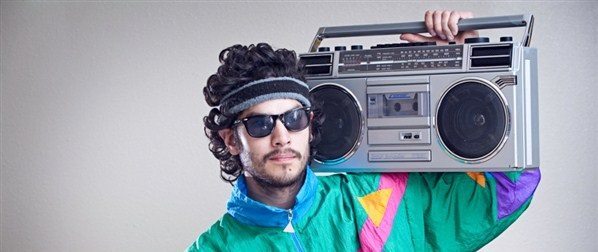“Are you not ashamed?”
photo: deusexmalcontent.com
As opinionated university students (and participants in the neverending expansion of the internet), we are constantly required to base our arguments on sound reasoning. And for better or worse, this extends to our cultural tastes: we are always expected to thoroughly justify how we feel about certain books, films and musical capers. As such, there’s no doubting the social pressures we can feel subject to when claiming to enjoy certain types of music. But should we really relegate some of our less edgy preferences to the category of “guilty pleasures”?
“Who Cares About ‘Cool’?”
Will Tucker
I used to be like you. I used to be constantly worried about what other people might think of my taste in music, and ceaselessly fretted over updating it. I’d read the NME every week (whilst going on about how crap it was), buy whatever was cool, and try to like whatever Zane Lowe had decreed what was “the hottest record in the world”. But then one day, I took my eye off the ball, and in doing so realised that it doesn’t matter.
That doesn’t mean I don’t still care deeply about good music. I do. I still search for meaningful and authentic music, made by artists who want to keep things interesting, honest and purposeful. I’ve just dropped “relevant” and “cool” from that list. Take my picks of last year, for example. Alongside Arctic Monkeys’ wonderful AM, of course, my favourite records were Sequel to the Prequel by Babyshambles and BE by Beady Eye. Seriously.
How lame is that? Sitting here as one of the shrinking band of Pete Doherty fanboys, wearing a t-shirt emblazoned with the cover of Sequel to the Prequel, I feel in a minority for still caring about a band most people thought split up six years ago, and a singer who many assume is long dead from a drug overdose.
I still search for meaningful and authentic music, made by artists who want to keep things interesting, honest and purposeful. I’ve just dropped “relevant” and “cool” from that list.
But it gets worse. I really, really like Beady Eye. Unlike the ’shambles, they’ve never been particularly popular. I will admit that their debut offered a series of pretty dull rock’n’roll throwbacks that were only notable for being slightly above the standard that many expected from “Oasis Without Noel”. But their second album – recorded with visionary producer and TV on the Radio lynchpin Dave Sitek – is a revelation.
Free from the burden of expectation which weighs on Noel’s shoulders (his High Flying Birds, for my money, are solid but predictable), Liam and co. have crafted an album of fearless invention and substantial quality. Sitek has allowed them to cast off the shackles of their past at last: ‘Second Bite of the Apple’ is marvellous, ‘Soul Love’ and ‘Don’t Brother Me’ are great, ‘Shine a Light’ is a lost Bond theme, and I’d go as far to say that ‘Flick of the Finger’ – complete with Tariq Ali spoken word passage – is one of the best songs of the decade so far.
I know that to admit all this is terribly uncool. But does this make Beady Eye a “guilty pleasure”? Nope; I don’t care.
“In Defence of Private Listening”
Sam Evans
Upon the recent launch of their “The Week in Pop” column, Stereogum proffered the following thoughts on the concept of the guilty pleasure: “in the internet era, the idea […] has been rendered irrelevant”. It functions perhaps partly as a backlash to the “indier-than-thou” mentality that dominated music criticism during the 2000s. Sites like Pitchfork could proclaim heretofore unknown bands such as Arcade Fire as the new bastions of taste, and anyone unfortunate enough to ignore them was viewed as just… uncool, man.
But now, in 2014, the consensus seems to have changed somewhat. Those who still listen to any album given significant hype by the blogosphere are often given the pejorative “hipster” label. Those who openly listen to pop music, on the other hand, are afforded more respect, perhaps due to their refusal to be ingested by the indie hype machine.
There’s something to be said for being able to listen to something without the judgement of a “real” music fan polluting your enjoyment.
Bearing this in mind, the question is raised as to what exactly constitutes a guilty pleasure in 2014. Last year arguably saw the largest crossover of popular and independent music to date. End-of-year lists were dominated by such names as Haim and Lorde. Arcade Fire were given a half-hour slot on NBC to perform new tracks from Reflektor. Vampire Weekend topped the Billboard 200, again. In response to the pop-ification of independent music, the spectre of Nick Hornby’s pretentious record store clerk loomed large this year. And he would certainly have you think that Random Access Memories should be considered a guilty pleasure.
The ridiculous thing is that the question of authenticity will never be solved, and more importantly, is entirely irrelevant. In Tame Impala, Kevin Parker probably does lift more than a little from the psychedelic music of the ’60s, but should you feel guilty for not listening to Cream bootlegs instead? Not at all, but that doesn’t stop a vocal minority of music snobs from reminding you that you should.
It’s hard to advocate keeping your music taste quiet purely out of shame. On the other hand, there’s something to be said for being able to listen to something without the judgement of a “real” music fan polluting your enjoyment. It might not be the highest form of art, but if you want to lie down and listen to CHVRCHES’ The Bones of What You Believe without feeling obligated to justify your choice in public, then that might just be okay.

Comments